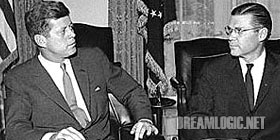Fog of War Review
FOG OF WAR | DO NOT MISS THIS ONE [MAR 7, 2005]

Fog of War
Documentary by Errol Morris, Soundtrack by Phillip Glass
For such a small word, WAR imbibes and evokes the presence of fear, destruction, and humility. But does it hold any connotations with the word humanity? Americans as a nation wholeheartedly supported and slaved for WWI, turned a deaf ear on the Korean War, then split on the controversial Vietnam war. How educated or compassionate does one have to be in order to recognize the travesties of battle? Do you think you really know what went on during these prominent historical battles? Or does it all boil down to the punchline, or the headline rather, “we won!”..? In the Fog of War, through the winded and financially successful job route of Mr. Robert McNamara, we search for the answers to the proverbial question: is war ever really necessary?
McNamara says that one of his earliest memories is when he witnessed the end of WWI, an event commonly declared as the “the war to end wars”. Little did he know that the rest of his life and present day, would be drastically haunted by war and its repercussions. Quickly fast-forwarding through his earlier and self-proclaimed glib-ridden days, he had graduated from Berkeley, received his MBA from Harvard where he met his wife and became an assistant professor. Happy times, he recalls, since he was pulling in a lucrative salary amidst the financial depression of his former classmates. He later served in the US Air Force, was promoted to Lieutenant Colonel and earned the Legion of Merit.
Barely a decade passed before he was asked to be a director in the newest, latest up-and-coming invention of the time: Ford Motors. About three years later, he became the president of the company. Only a year later he resigned, but his efforts in raising the Ford empire caught the eye of President John F. Kennedy, who asked him remotely to become his Secretary of Treasury. When McNamara declined, stating that he could never effectively carry out such heavy responsibilities, the presidential liaison simply offered the Secretary of Defense position instead. This he accepted.
So far you can tell that Robert McNamara was indeed a thorough, organized, ambitious man who was probably commended left and right for his duty and business sense. Not so. He was often vilified by the media as an egotistical sheister. In this documentary, it is up to you to decide what to believe. Much of the interview is so incredibly astute that it almost feels scripted. Did McNamara and his headstrong personality corrupt the leading world power’s military forces? Is this just an old man’s lament and repentance? You can tell by his eyes and in his wavering voice during the recounts of the War, that these scenes have plagued him as if they happened only yesterday. His memory is sharp and clear, and by telling the audience first-hand, you can hear the concern and defeat once Lyndon Johnson took over.

I won’t divulge the details, because it is up to you to decipher and watch the documentary or pick up a history book, but the important part is that McNamara wanted desperately to empathize with his enemies and the troops. His analytical device sought strength in admitting his faults; admitting his leaders’ faults. But misjudgment and hindsight cannot resurrect those who perished –Americans and foreigners slaughtered by Americans. His infamous rows with Lamay, the stern military commander who, in McNamara’s eyes, never admitted guilt, never described a risk, whether in firebombing 100,000 Japanese civilians before the atomic bomb was ever dropped, or sending American troops to the abattoir known as Vietnam. Please keep in mind that this recount does not excuse McNamara from his own responsibilities during the war, no matter how convincing and pseudo-apologetic he may seem.
While this movie circles around the attempts to prevent our troops and our allies from harm, it is also largely a recount of human error. What evidence must be presented in order to start a war? Was the Vietnam War started on a false technicality or maybe even a fabrication? (Much like the Ahmad Chalabi/CIA blame game of today, no?) Reporters and rogue rumors branded McNamara as arrogant and stubborn, but there is no doubt that he was always clearly thoughtful of human rights. You’ll get to witness that in the newly released recordings of his conversations with JFK and LBJ concerning the Vietnam War.
One more poignant thought brought up is when McNamara recalls the Cold War as governed under the command of rational leaders. Rational leaders who were willing to sacrifice hundreds of thousands of their own countrymen for nuclear technology. Presently, I’m wondering how rational North Korea’s Kim Jong Il is. This movie is so powerful, you’ll be amazed how one man could influence so many diverse aspects of American culture, and remain simultaneously enamored by and repulsed by his actions. I strongly urge you to check out the amazing site at: http://www.sonyclassics.com/fogofwar/indexFlash.html and of course, the movie.
–Kris Kobayashi